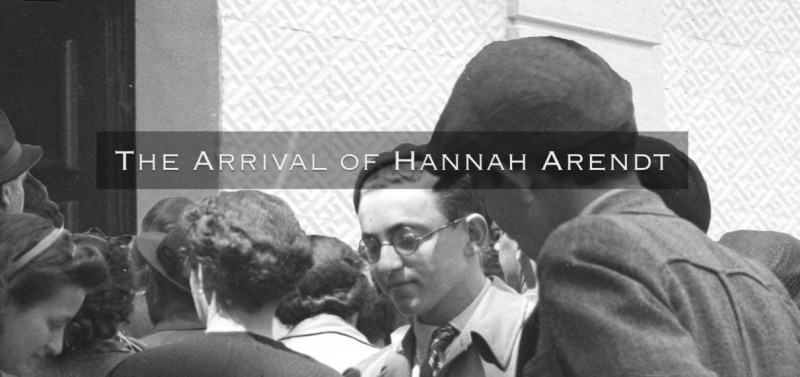
The Arrival of Hannah Arendt
This film describes the arrival of Hannah Arendt - a Jewish, German-American political theorist and publicist - in New York and her reflections on flight and helping people start over.
Herrn Max Oppenheimer
c/o 1 W. 67 Street
New York, N.Y.
Sehr geehrter Herr Oppenheimer:
Die American Guild for German Cultural Freedom hat es sich zur Aufgabe gemacht, dem bedraengten deutschen Geistesleben im Exil Hilfe zu bringen, nicht durch Wohltätigkeit sondern durch produktive Foerderung. Insbesondere verleiht sie Stipendien für kuenstlerische literarische und wissenschaftliche Werke, die begonnen oder ernstlich geplant sind, und foerdert Ihre Veroeffentlichung und Darstellung.
Die Guild hat während des letzten Jahres hervorragende Arbeit geleistet und kann auf schöne Erfolge zurueck blicken. Wir haben Werk und Leben einer stattlichen Anzahl schaffender deutscher Menschen erhalten.
Beratung und Mitarbeit wurden literarische, musikalische, und wissenschaftliche Komitees gebildet und in unserem “Europaeischen Rates” zusammengefasst, dessen Vorsitz Thomas Mann und Sigmund Freud fuehren. Mitglieder des Rates sind unter anderen Lion Feuchtwanger, Bruno Frank, Heinrich Mann, Alfred Neumann, Rene Schickele, Fritz von Unruh, Franz Werfel, Stefan Zweig, Adolf Busch, Max Graf, Otto Klemperer, Artur Schnabel, Rudolf Serkin, Bruno Walter, Alexander von Zemlinski, Hans von Hentig, Eduard Heimann, Emil Lederer, Leopold Lichtwitz, Siegfried Neuman, Paul J. Tillich, Veit Valentin, Max Reinhardt, Erwin Piscator.
Die American Guild ist im Begriff, dem Europaeischen Rat eine repraesentative Vertretung der bildenden und darstellenden Künste einzugliedern und ihre Taetigkeit staerker als bisher auf diesem Gebieten zu entfalten. Die Zahl der Künstler im Exil, die sich um Rat und Hilfe and die Guild wenden, ist staendig am Steigen. Wir moechten Sie bitten, Mitglied dieses Komitees zu werden und dem gemeinsamen Werk Ihren Rat und Ihre Erfahrung zur Verfuegung zu stellen.
Da wir eben unsere neue Literatur vorbereiten und gerne Ihren Namen einschließen wuerden, waeren wir Ihnen für baldige Antwort dankbar.
Ihr aufrichtiger Hochachtung:
Generalsekretaer.
April 1939.
Mr. Max Oppenheimer
c/o 1 W. 67 Street
New York, N.Y.
Dear Mr. Oppenheimer:
The American Guild for German Cultural Freedom is dedicated to bringing relief to the distressed German intellectual life in exile, not through charity but through productive encouragement. In particular, it awards grants for artistic literary and scientific works begun or seriously planned, and encourages their publication and presentation.
The Guild has done excellent work during the past year and has had some fine successes. We have preserved the work and lives of a goodly number of creative German people.
Literary, musical, and scientific committees have been formed and combined in our “European Council,” chaired by Thomas Mann and Sigmund Freud. Members of the Council include Lion Feuchtwanger, Bruno Frank, Heinrich Mann, Alfred Neumann, Rene Schickele, Fritz von Unruh, Franz Werfel, Stefan Zweig, Adolf Busch, Max Graf, Otto Klemperer, Artur Schnabel, Rudolf Serkin, Bruno Walter, Alexander von Zemlinski, Hans von Hentig, Eduard Heimann, Emil Lederer, Leopold Lichtwitz, Siegfried Neuman, Paul J. Tillich, Veit Valentin, Max Reinhardt, Erwin Piscator.
The American Guild is in the process of incorporating into the European Council a representative body for the visual and performing arts, and of developing its activities in these fields to a greater extent than hitherto. The number of artists in exile who turn to the Guild for advice and assistance is steadily increasing. We would like to ask you to become a member of this committee and to offer your advice and experience to the common work.
As we are preparing our new literature and would like to include your name, we would be grateful for a prompt reply.
Yours sincerely:
Secretary General.
Max Oppenheimer, later known as MOPP, was an Austrian painter and graphic artist. He was born in Vienna, studied at the Academy of Fine Arts there as well as in Prague. Along with Egon Schiele, with whom he shared a studio in 1910, and Oskar Kokoschka, he was considered one of Austria’s leading avant-garde artists, influenced by Expressionism, Cubism and Futurism. Active in Berlin and Switzerland for 20 years, he returned to Vienna in 1931. A year later, as part of the wave of persecution following the Reichstag fire, his work became the victim of a defamation campaign by the SA. In 1937, ten of Oppenheimer’s works were confiscated from the city collections of Berlin, the Anhaltische Gemäldegalerie in Dessau, the Kestner Museum in Hanover, the Ruhmeshalle in Wuppertal-Barmen, and the Städtische Bildergalerie in Wuppertal-Elberfeld as part of the Nazi “Degenerate Art” campaign. All but one of the works were destroyed. Oppenheimer fled first to Switzerland and then to the United States, where the American Guild for German Cultural Freedom contacted him in April 1939 with a request to join its visual and performing arts committee.
The American Guild for German Cultural Freedom was an organization that helped German artists, writers, and intellectuals in exile whose work opportunities were impaired by the fascist government in Germany. The goal of the organization was to keep German culture alive outside of Germany, as it could not survive and thrive within German borders. The American Guild for German Cultural Freedom helped these people by providing financial support. The refugee experience of the German exiles was different for each individual. One of the main difficulties in fleeing is adjusting to a completely new place and finding a support system. The American Guild for German Cultural Freedom tried to help the German exiles with this adjustment so that they could also focus on their work at the same time.
Letter to Mr. Max Oppenheimer from the Secretary General of the American Guild for German Cultural Freedom, April 1939 © with permission from the Exilarchiv der Nationalbibliothek in Frankfurt, Germany.